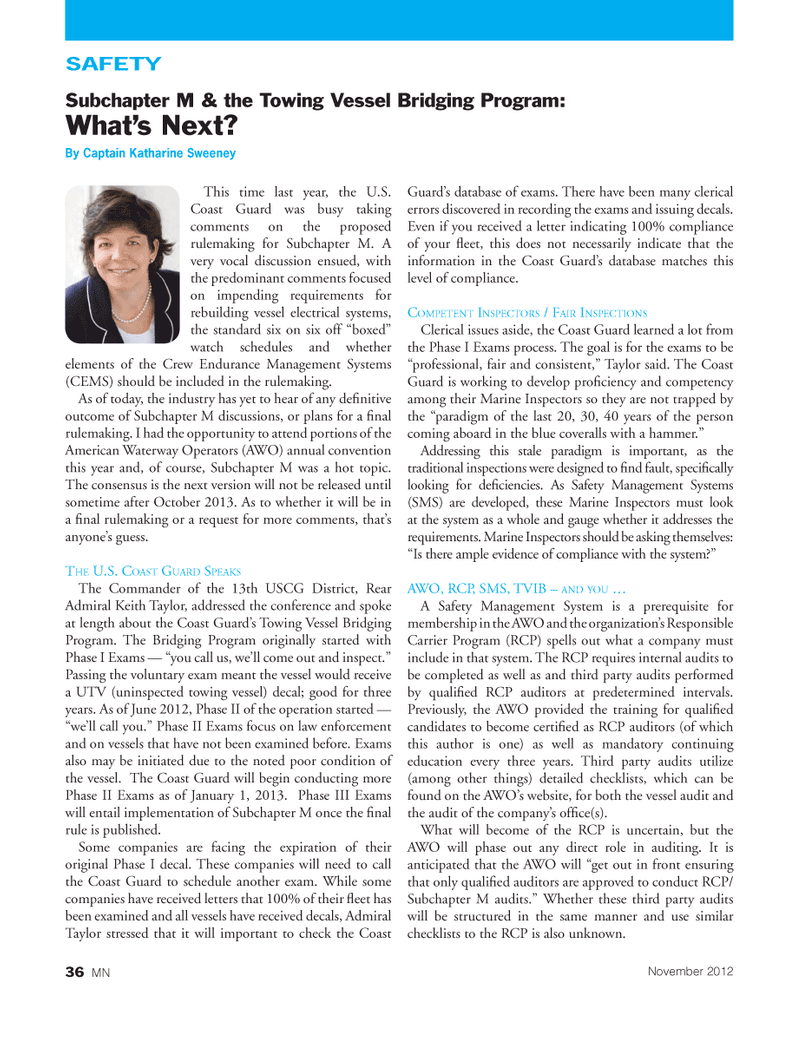
Page 36: of Marine News Magazine (November 2012)
Workboat Annual
Read this page in Pdf, Flash or Html5 edition of November 2012 Marine News Magazine
This time last year, the U.S. Coast Guard was busy taking comments on the proposed rulemaking for Subchapter M. A very vocal discussion ensued, with the predominant comments focused on impending requirements for rebuilding vessel electrical systems, the standard six on six off ?boxed? watch schedules and whether elements of the Crew Endurance Management Systems (CEMS) should be included in the rulemaking. As of today, the industry has yet to hear of any de nitive outcome of Subchapter M discussions, or plans for a nal rulemaking. I had the opportunity to attend portions of the American Waterway Operators (AWO) annual convention this year and, of course, Subchapter M was a hot topic. The consensus is the next version will not be released until sometime after October 2013. As to whether it will be in a nal rulemaking or a request for more comments, that?s anyone?s guess. THE U.S. COAST GUARD SPEAKS The Commander of the 13th USCG District, Rear Admiral Keith Taylor, addressed the conference and spoke at length about the Coast Guard?s Towing Vessel Bridging Program. The Bridging Program originally started with Phase I Exams ? ?you call us, we?ll come out and inspect.? Passing the voluntary exam meant the vessel would receive a UTV (uninspected towing vessel) decal; good for three years. As of June 2012, Phase II of the operation started ? ?we?ll call you.? Phase II Exams focus on law enforcement and on vessels that have not been examined before. Exams also may be initiated due to the noted poor condition of the vessel. The Coast Guard will begin conducting more Phase II Exams as of January 1, 2013. Phase III Exams will entail implementation of Subchapter M once the nal rule is published. Some companies are facing the expiration of their original Phase I decal. These companies will need to call the Coast Guard to schedule another exam. While some companies have received letters that 100% of their eet has been examined and all vessels have received decals, Admiral Taylor stressed that it will important to check the Coast Guard?s database of exams. There have been many clerical errors discovered in recording the exams and issuing decals. Even if you received a letter indicating 100% compliance of your eet, this does not necessarily indicate that the information in the Coast Guard?s database matches this level of compliance. COMPETENT INSPECTORS / FAIR INSPECTIONS Clerical issues aside, the Coast Guard learned a lot from the Phase I Exams process. The goal is for the exams to be ?professional, fair and consistent,? Taylor said. The Coast Guard is working to develop pro ciency and competency among their Marine Inspectors so they are not trapped by the ?paradigm of the last 20, 30, 40 years of the person coming aboard in the blue coveralls with a hammer.? Addressing this stale paradigm is important, as the traditional inspections were designed to nd fault, speci cally looking for de ciencies. As Safety Management Systems (SMS) are developed, these Marine Inspectors must look at the system as a whole and gauge whether it addresses the requirements. Marine Inspectors should be asking themselves: ?Is there ample evidence of compliance with the system?? AWO, RCP, SMS, TVIB ? AND YOU ?A Safety Management System is a prerequisite for membership in the AWO and the organization?s Responsible Carrier Program (RCP) spells out what a company must include in that system. The RCP requires internal audits to be completed as well as and third party audits performed by quali ed RCP auditors at predetermined intervals. Previously, the AWO provided the training for quali ed candidates to become certi ed as RCP auditors (of which this author is one) as well as mandatory continuing education every three years. Third party audits utilize (among other things) detailed checklists, which can be found on the AWO?s website, for both the vessel audit and the audit of the company?s of ce(s). What will become of the RCP is uncertain, but the AWO will phase out any direct role in auditing. It is anticipated that the AWO will ?get out in front ensuring that only quali ed auditors are approved to conduct RCP/ Subchapter M audits.? Whether these third party audits will be structured in the same manner and use similar checklists to the RCP is also unknown. SAFETYSubchapter M & the Towing Vessel Bridging Program: What?s Next? By Captain Katharine SweeneyNovember 201236 MNMNNov2012 Layout 32-49.indd 36MNNov2012 Layout 32-49.indd 3611/6/2012 3:15:20 PM11/6/2012 3:15:20 PM

 35
35

 37
37
